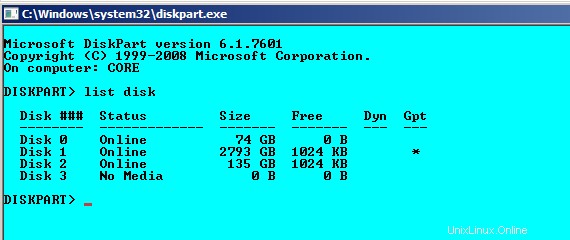Da ist diskpart
[Start] [Ausführen] diskpart list disk

Außerdem gibt es wmic diskdrive . Sie können das von der Befehlszeile aus verwenden, aber Sie möchten wahrscheinlich einige Filter anwenden, um zu vermeiden, dass Sie am Ende viel zu viele Informationen erhalten.
Availability BytesPerSector Capabilities CapabilityDescriptions Caption CompressionMethod ConfigManagerErrorCode ConfigManagerUserConfig CreationClassName DefaultBlockSize Description DeviceID ErrorCleared ErrorDescription ErrorMethodology FirmwareRevision Index InstallDate InterfaceType LastErrorCode Manufacturer MaxBlockSize MaxMediaSize MediaLoaded MediaType MinBlockSize Model Name NeedsCleaning NumberOfMediaSupported Partitions PNPDeviceID PowerManagementCapabilities PowerManagementSupported SCSIBus SCSILogicalUnit SCSIPort SCSITargetId SectorsPerTrack SerialNumber Signature Size Status StatusInfo SystemCreationClassName SystemName TotalCylinders TotalHeads TotalSectors TotalTracks TracksPerCylinder
512 {3, 4} {"Random Access", "Supports Writing"} LSI 9750-8i DISK SCSI Disk Device 0 FALSE Win32_DiskDrive Disk drive \\.\PHYSICALDRIVE0 5.08 0 SCSI (Standard disk drives) TRUE Fixed hard disk media LSI 9750-8i DISK SCSI Disk Device \\.\PHYSICALDRIVE0 2 SCSI\DISK&VEN_LSI&PROD_9750-8I____DISK\5&15EE98A3&0&000000 0 0 10 0 19 L2080BGN154FA1000272 -576210269 79987195904 OK Win32_ComputerSystem CORE 36707 224 156224992 8222368 224
512 {3, 4} {"Random Access", "Supports Writing"} LSI 9750-8i DISK SCSI Disk Device 0 FALSE Win32_DiskDrive Disk drive \\.\PHYSICALDRIVE1 5.08 1 SCSI (Standard disk drives) TRUE Fixed hard disk media LSI 9750-8i DISK SCSI Disk Device \\.\PHYSICALDRIVE1 2 SCSI\DISK&VEN_LSI&PROD_9750-8I____DISK\5&15EE98A3&0&000100 0 0 10 1 63 WQC05071864F9000A2CB 2999965248000 OK Win32_ComputerSystem CORE 364725 255 5859307125 93004875 255
512 {3, 4} {"Random Access", "Supports Writing"} LSI 9750-8i DISK SCSI Disk Device 0 FALSE Win32_DiskDrive Disk drive \\.\PHYSICALDRIVE2 5.08 2 SCSI (Standard disk drives) TRUE Fixed hard disk media LSI 9750-8i DISK SCSI Disk Device \\.\PHYSICALDRIVE2 1 SCSI\DISK&VEN_LSI&PROD_9750-8I____DISK\5&15EE98A3&0&000200 0 0 10 2 63 P6901YFP93CC9C000C66 -900772765 144987010560 OK Win32_ComputerSystem CORE 17627 255 283177755 4494885 255
Generic Flash HS-COMBO USB Device 0 FALSE Win32_DiskDrive Disk drive \\.\PHYSICALDRIVE3 4.44 3 USB (Standard disk drives) TRUE Generic Flash HS-COMBO USB Device \\.\PHYSICALDRIVE3 0 USBSTOR\DISK&VEN_GENERIC&PROD_FLASH_HS-COMBO&REV_4.44\070809103045&1 0 OK Win32_ComputerSystem CORE
OK, es besteht kein Zweifel, dass diskpart ist ein nettes Tool für Windows-Partitionen, aber es sieht so aus, als ob es nur die lokale Windows-Festplatte und ihre Partitionen lesen oder bearbeiten kann, es konnte die Festplattendatei wie MBR nicht erkennen , recovery , oder EBR1 Partitionsdatei, die Sie im Linux-Dateisystem sehen; Es gibt also wirklich ein Tool, das fdisk entspricht viel im Windows-System, es ist ein cmd-Tool, das ist sein Name und seine Download-Website:
GPT fdisk herunterladen
und dies ist sein Bild, um meinen MBR zu erkennen Datei:
GPT fdisk-Screenshot
Es hat eine ähnliche Syntax wie fdisk -l filename , können Sie gdisk64.exe -l filename verwenden .
Die Download-Seite enthält auch die offizielle Website, Sie können sie weiter nutzen! oder verwenden Sie einfach den gdisk64.exe /? in cmd für mehr _